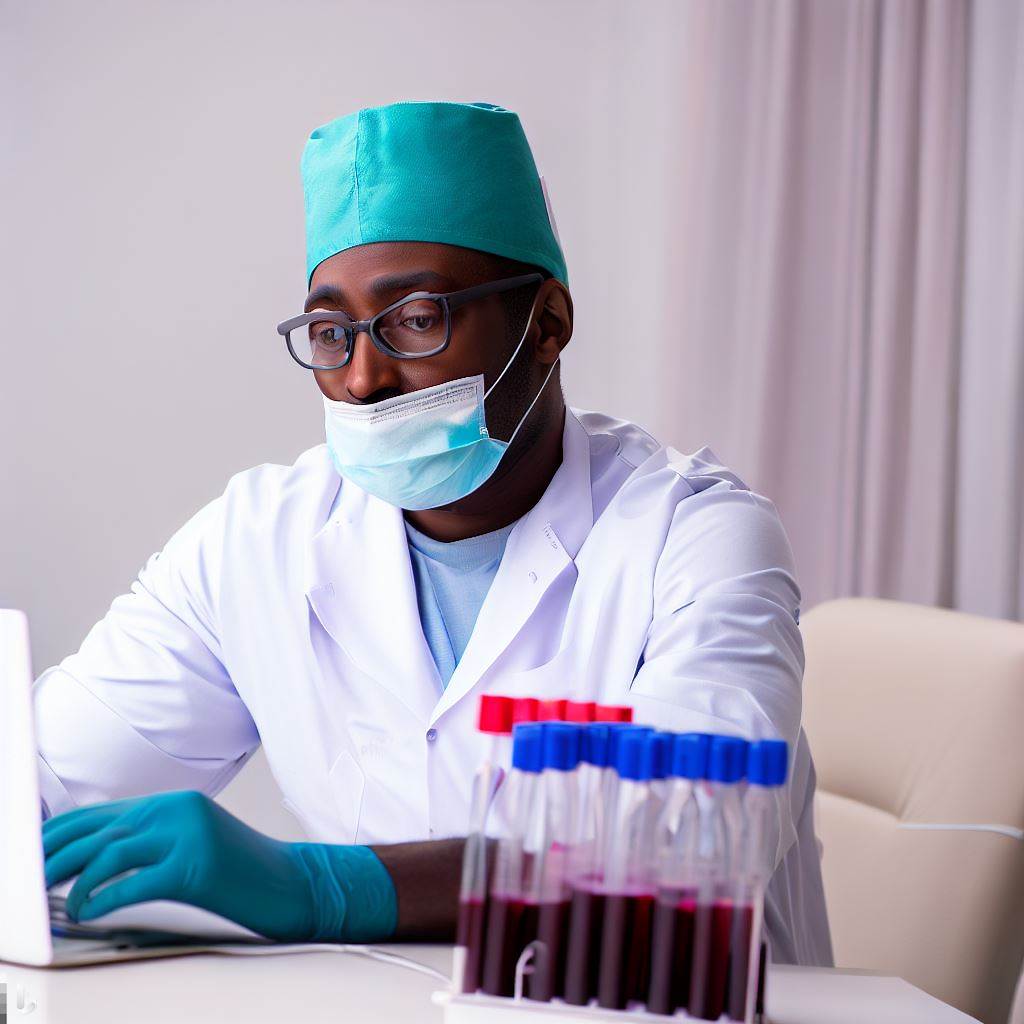Introduction
A phlebotomist is a healthcare professional responsible for drawing blood from patients. In this blog post, we will be introduced to Amina, a Nigerian phlebotomist with years of experience.
The purpose of this blog post is to provide insight into the daily life of a Nigerian phlebotomist and their challenges.
Background on Nigerian Healthcare System
Overview of the Nigerian Healthcare System
The Nigerian healthcare system is a complex network of public and private institutions. It is divided into primary, secondary, and tertiary levels of care.
Public healthcare services are provided by the government, while private healthcare services are run by individuals or organizations.
Primary healthcare centers (PHCs) are the first point of contact for most Nigerians and provide basic medical care. Secondary and tertiary healthcare facilities offer specialized and advanced medical services.
Challenges Faced by the Healthcare System in Nigeria
The Nigerian healthcare system faces numerous challenges that hinder access to quality healthcare.
Some of these challenges include inadequate funding, poor infrastructure, and a shortage of healthcare professionals.
There is also a lack of necessary medical equipment and supplies in many healthcare facilities.
Additionally, the unequal distribution of healthcare resources between urban and rural areas further exacerbates these challenges.
Importance of Phlebotomists in Healthcare Settings
Phlebotomists play a crucial role in healthcare settings by collecting blood samples for diagnostic testing.
They ensure that samples are properly labeled, stored, and transported to the laboratory for analysis.
Accurate and reliable blood test results are essential for accurate diagnosis and effective treatment of various medical conditions.
Phlebotomists also interact directly with patients, providing emotional support and maintaining a calm and reassuring environment during the procedure.
Understanding the background of the Nigerian healthcare system is vital in addressing the challenges it faces.
By recognizing the importance of phlebotomists and the role they play in healthcare settings, we can work towards improving the quality of healthcare in Nigeria and ensuring better access to diagnostics and treatment.
Efforts should be made to increase funding, improve infrastructure, and train more healthcare professionals.
By doing so, we can strive towards a more equitable and effective healthcare system in Nigeria.
Read: Path to Becoming a Successful Optometrist in Nigeria
A Typical Day as a Nigerian Phlebotomist
Description of the phlebotomist’s workplace
The phlebotomist’s workplace in Nigeria is typically a clinical setting, such as a hospital, diagnostic laboratory, or medical center.
It is a crucial and integral part of the healthcare system, where the phlebotomist plays a vital role in drawing blood samples from patients for various medical tests, transfusions, or donations.
The workspace is equipped with essential medical equipment, including blood collection tubes, needles, and sterilization materials.
It adheres to strict hygiene and safety protocols to prevent cross-contamination and infections.
The phlebotomist interacts with diverse patients, ensuring a compassionate and professional approach to ease their anxieties during blood collection procedures.
As Nigeria continues to enhance its healthcare infrastructure, the phlebotomist’s workplace strives to maintain high standards of patient care and quality sample collection, contributing significantly to accurate diagnoses and effective treatment plans.
Daily tasks performed by the phlebotomist
- Arriving at the healthcare facility: The phlebotomist starts their day by reporting to the healthcare facility, ready to provide quality care.
- Preparing equipment and supplies: They ensure that all necessary tools, such as needles, tubes, and gloves, are clean and readily available.
- Interacting with patients: Building rapport with patients is crucial, as the phlebotomist must make them feel comfortable and at ease.
- Collecting blood samples: Using their expertise, the phlebotomist skillfully draws blood samples from patients’ veins for various diagnostic tests.
- Properly labeling and storing samples: They carefully label each sample to prevent mix-ups and store them in a secure location for further analysis.
- Communicating with other healthcare professionals: Collaboration with doctors, nurses, and lab technicians is essential to ensure accurate test results and patient care.
Challenges faced by the phlebotomist during a typical day
Being a phlebotomist comes with its own set of challenges, including:
- Coping with patients who fear or dislike needles, requiring additional reassurance and patience.
- Dealing with patients who have difficult-to-access veins, making blood collection more challenging.
- Handling potentially infectious materials, emphasizing the need for strict adherence to safety protocols.
- Managing a high volume of patients, necessitating efficient time management and multitasking skills.
- Maintaining accuracy in labeling and documentation to prevent errors in patient identification and sample analysis.
- Remaining calm and professional during emergency situations that require immediate blood collection.
In general, being a Nigerian phlebotomist involves working in a well-equipped healthcare facility, interacting with patients, and collecting blood samples with precision.
Despite facing challenges, their dedication to patient care ensures the accurate diagnosis and treatment of various medical conditions.
Read: Comparing Phlebotomy Courses in Nigerian Medical Schools
Patient Stories and Experiences
Sharing personal accounts of memorable patients
One of the most rewarding aspects of being a Nigerian phlebotomist is the opportunity to encounter a diverse range of patients and hear their unique stories.
From the elderly to children, every patient brings a different experience and lesson.
I vividly remember a young girl named Amara who was diagnosed with a rare blood disorder.
Despite her young age, she displayed immense strength and courage during every blood draw.
Witnessing her resilience was a constant reminder of the importance of my role as a phlebotomist.
Another memorable patient was Mr. Ade, a middle-aged man who had anxiety towards needles. Each time he arrived for his blood work, he would be visibly nervous.
Through constant reassurance and gentle communication, I was able to alleviate his anxiety and create a safe space for him.
Building this trust and connection with patients is an essential part of our job as phlebotomists.
Highlighting the importance of empathy and compassion in the role
Empathy and compassion are fundamental qualities that every phlebotomist should possess. Patients walking into the clinic may be experiencing various emotions, ranging from fear to frustration.
It is our duty as healthcare professionals to provide a sense of comfort and support.
One specific instance comes to mind when a young woman named Chioma came in for her blood work after receiving a devastating diagnosis.
She was visibly distraught and overwhelmed. By offering a listening ear and showing genuine empathy, I was able to provide her with a safe space to express her fears and concerns.
This type of emotional support is just as important as the physical procedure.
Not only does empathy and compassion create a better experience for the patient, but it also aids in accurate blood collection.
By establishing a rapport and ensuring the patient feels comfortable, it becomes easier to obtain the necessary samples.
The impact of a phlebotomist’s demeanor and approach should never be underestimated.
Demonstrating the impact of phlebotomists on patients’ lives
Phlebotomists play a crucial role in healthcare by providing vital information for diagnosis and treatment.
Our actions directly impact the lives of patients, even if we may not always see the immediate results. Each blood draw has the potential to save a life or provide crucial insights into a patient’s condition.
One instance that showcases this impact was when a routine blood test revealed elevated levels of a specific marker in a patient’s blood.
This discovery led to an early diagnosis of an underlying condition, enabling timely intervention and treatment.
Witnessing firsthand how our work can directly contribute to positive outcomes reinforces the significance of our role as phlebotomists.
In essence, patient stories and experiences truly highlight the multifaceted nature of being a Nigerian phlebotomist.
From personal accounts of memorable patients to emphasizing the importance of empathy and compassion, we understand the impact our role has on patients’ lives.
Through our actions, we strive to make each patient’s experience as comfortable and meaningful as possible.
Read: Impact of Economic Factors on O&P Practice in Nigeria

Educational Journey of a Nigerian Phlebotomist
A day in the life of a Nigerian phlebotomist is not only filled with challenging tasks and patient interactions, but also involves a rigorous educational journey.
In this section, we will explore the required education and certifications, training and professional development opportunities, as well as the importance of continuous learning in the field of phlebotomy.
Required education and certifications
Completion of secondary education is the first step towards becoming a phlebotomist in Nigeria. After secondary school, aspiring phlebotomists must enroll in a recognized training program.
These training programs typically last for about six months and cover various aspects of the field. Upon successful completion of the training program, phlebotomists are required to obtain certifications.
The most common certification in Nigeria is the Certified Phlebotomy Technician (CPT) credential.
Obtaining the CPT credential involves passing a certification exam conducted by recognized medical bodies.
Training and professional development opportunities
Training programs for phlebotomists in Nigeria are offered by various institutions, including hospitals and vocational schools.
These programs provide hands-on training, classroom lectures, and practical experiences to develop phlebotomy skills.
Phlebotomists also have the opportunity to enhance their knowledge and skills through professional development.
Workshops, conferences, and seminars are organized by medical associations to keep phlebotomists up-to-date with advancements.
Participating in these events not only provides new insights but also helps in networking with other professionals in the field.
Importance of continuous learning in the field
Continuous learning is crucial for phlebotomists to stay updated with the latest techniques and regulations. Advancements in technology and research constantly impact the field of phlebotomy.
Phlebotomists need to be aware of new blood collection procedures, safety protocols, and infection control measures.
Continuous learning ensures that phlebotomists provide accurate and high-quality services to patients.
Moreover, ongoing education and professional development increase the career prospects and job opportunities for phlebotomists.
Employers value phlebotomists who are committed to staying current and improving their skills through continuous learning.
In fact, the journey to becoming a Nigerian phlebotomist involves completing the required education and certifications, participating in training and professional development opportunities, and recognizing the importance of continuous learning.
By staying updated and enhancing their skills, phlebotomists can provide excellent patient care and build a successful career in the field.
Read: Phlebotomist’s Career Outlook in Nigeria for 2023-2028
Career Prospects and Opportunities
Job market for phlebotomists in Nigeria
The demand for phlebotomists in Nigeria is steadily increasing due to the rise in healthcare facilities.
Hospitals, clinics, diagnostic laboratories, and blood banks are common places where phlebotomists can find employment.
Phlebotomists play a crucial role in collecting blood samples, which are essential for medical diagnoses and research.
As medical technology continues to advance, the need for skilled phlebotomists will continue to grow.
Phlebotomy is a specialized field that requires proper certification and training to ensure competent professionals.
Advancement opportunities and potential career paths
Phlebotomy is an excellent entry-level career path for individuals interested in the healthcare industry.
With experience and additional certifications, phlebotomists can advance to supervisory or management roles.
Some phlebotomists choose to specialize in specific areas such as pediatric phlebotomy or geriatric phlebotomy.
Others may opt to pursue further education and become medical laboratory scientists or nurses. Advancement opportunities are available in research institutions, blood banks, and larger medical facilities.
Benefits and rewards of a career as a phlebotomist
Phlebotomy offers job stability and security as the demand for qualified professionals continues to grow. It can be a financially rewarding career, especially with experience and additional certifications.
Phlebotomists have the opportunity to work in a variety of healthcare settings and interact with diverse patients.
They play a vital role in the healthcare team, contributing to accurate diagnoses and patient care. Phlebotomists gain valuable skills in blood collection, specimen processing, and laboratory techniques.
There is a sense of fulfillment in knowing that phlebotomists contribute to improving patients’ health and well-being.
Basically, the job market for phlebotomists in Nigeria is promising, offering numerous career prospects and opportunities for growth.
With the increasing demand for healthcare services, phlebotomists are essential in collecting blood samples for diagnoses and research.
Publish Your Professional Profile, Business or Brand
Showcase your expertise, gain trust, and boost visibility instantly on Professions.ng.
Publish NowAdvancement opportunities include leadership roles, specialization, and further education in related fields.
A career as a phlebotomist is rewarding both financially and personally, providing stability, valuable skills, and the satisfaction of contributing to patient care.
Read: The Journey to Becoming a Registered Nurse in Nigeria
Find Out More: Understanding the Role of an Optometrist in Nigeria’s Healthcare
Conclusion
Recap of the typical day of a Nigerian phlebotomist
Throughout this blog post, we have explored the daily experiences of a Nigerian phlebotomist.
From the early morning preparations to the collection of blood samples, their work requires precision, compassion, and dedication.
We have seen how they navigate the challenges of long hours, difficult veins, and patient anxiety.
Final thoughts on the experiences shared in the blog post
The stories shared by the Nigerian phlebotomist provide a valuable insight into the crucial role they play in the healthcare system.
Their contributions are often overlooked, but their expertise and skill are essential in accurate diagnosis and treatment.
Encouraging readers to consider the importance of phlebotomists in healthcare
It is important for readers to recognize the significant role phlebotomists play in healthcare. Their ability to collect blood samples effectively ensures that patients receive appropriate care and treatment.
Next time you visit a medical facility, take a moment to appreciate the phlebotomist working diligently behind the scenes.
The life of a Nigerian phlebotomist is demanding but rewarding. Their dedication to their craft and the impact they have on patient care should not be underestimated.
Let us strive to support and acknowledge these professionals, highlighting their importance in the healthcare system.




